2017 Annual Coffee Survey: baristas Survey data released
First of all, I wish you all the best.
During Labour Day short holiday
Have a good time.
The editor just drank Zambia with ice. How about you?
Finally, the investigation is drawing to a close.
Thank you for your constant attention.
Today is the last article in the 2017 coffee survey.
Baristas survey data made public
Little friends who haven't seen it before.
The editor is ready for you, too.
▽
2017 Annual Coffee Survey | Coffee lover survey data are made public
2017 Annual Coffee Survey | the main survey data of cafes are made public
▽

In the barista questionnaire in the past few months,
We found that there were more males than females in baristas.
It was found that the highest salary for baristas was in North China.
Baristas are mostly engaged in this industry because of their passion.
...
In February 2017, we sent out three questionnaires and more than 7000 feedback, of which we received 2035 questionnaires on baristas. Is being a barista happy or not? Is there a prospect for development? Are you still in this industry ten years later? ...
Have you thought about that? The answer is below. Let's take a look at the results of the survey:
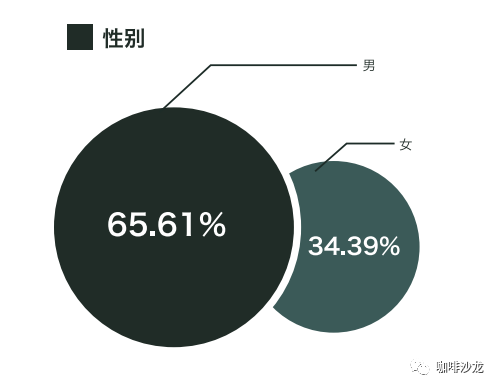
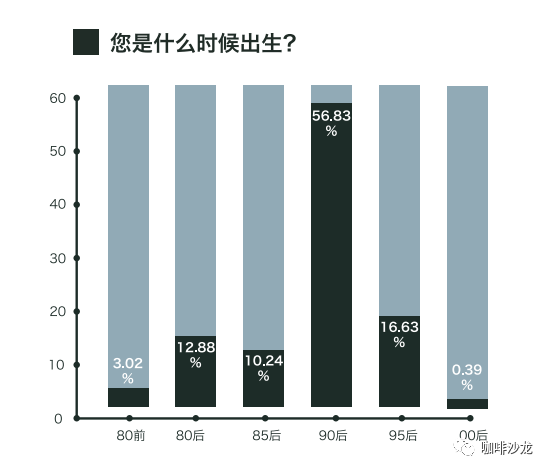
In the age group, more than half of the post-90s are employed as baristas, and their freshness is attractive to young people; on the other hand, for the post-80s, post-80s and post-85s, they are still a staunch force for the development of China's coffee industry.
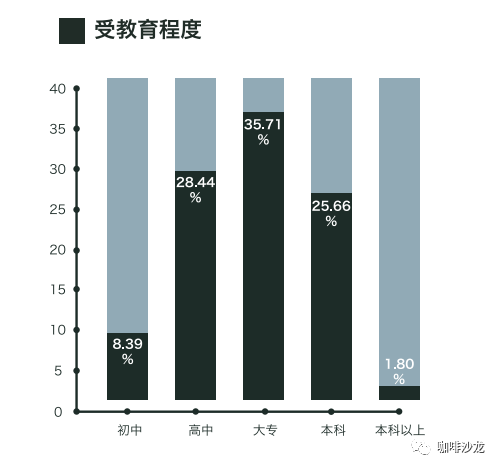
The survey shows that baristas with high school, college and bachelor's degrees account for 89.81%, of which college education accounts for 35.71%, while high school education also accounts for as much as 28%, which also shows that the employment threshold of the coffee industry is low.
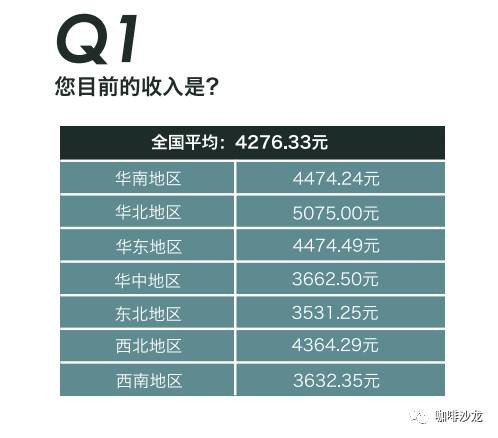
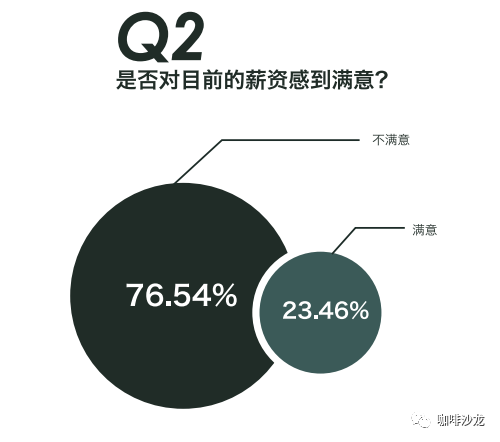
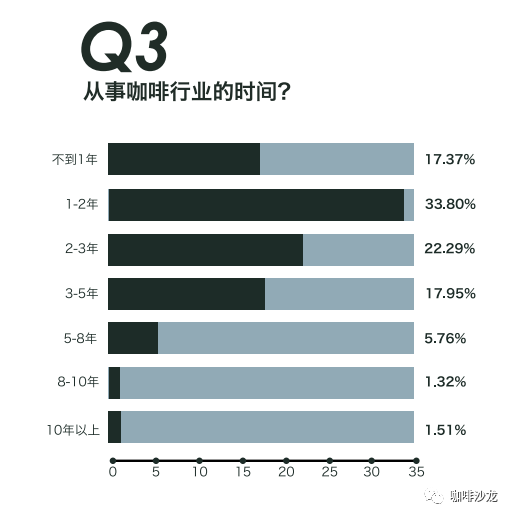
Most baristas have been employed for 1-2 years, accounting for 33.80%, followed by 2-3 years, accounting for 22.29%. However, less than 3% have been employed for 8-10 years or more, indicating that most coffee practitioners start as baristas and then switch to other coffee-related professions or do not stick to the coffee industry.
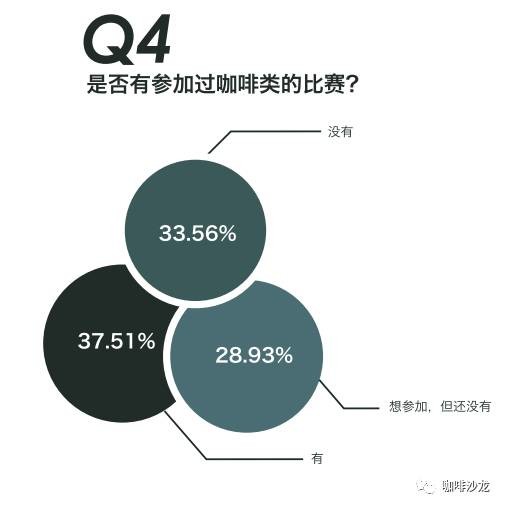
Coffee events have attracted a lot of attention in recent years, of which 37.51% of baristas have participated in the competition, 28.93% of baristas still linger in front of the competition, and 33.56% of baristas did not participate in the competition.
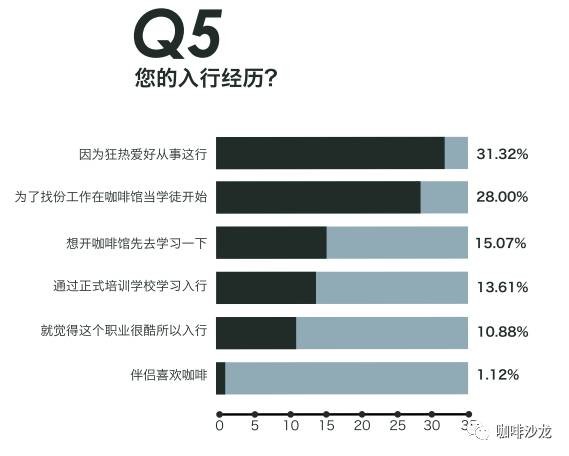
31.32% of baristas are engaged in this industry because of their fanaticism, accounting for the largest proportion, indicating that most baristas choose coffee as a career because they like coffee.
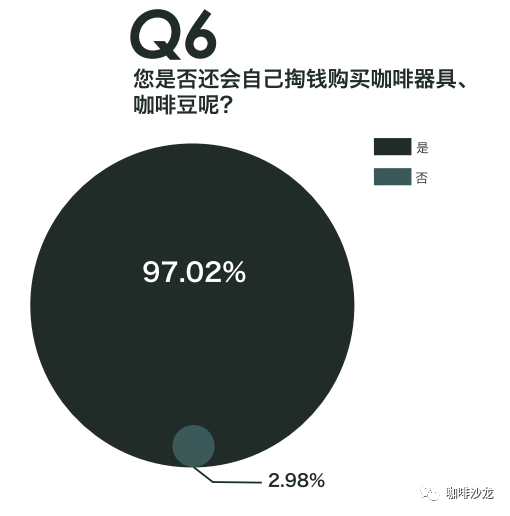
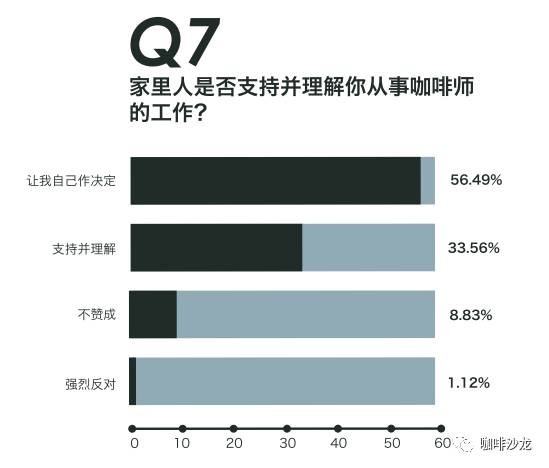
Up to 90.05% of baristas' families support or do not interfere with their work as baristas, while 9.95% of baristas' families do not support or oppose it.
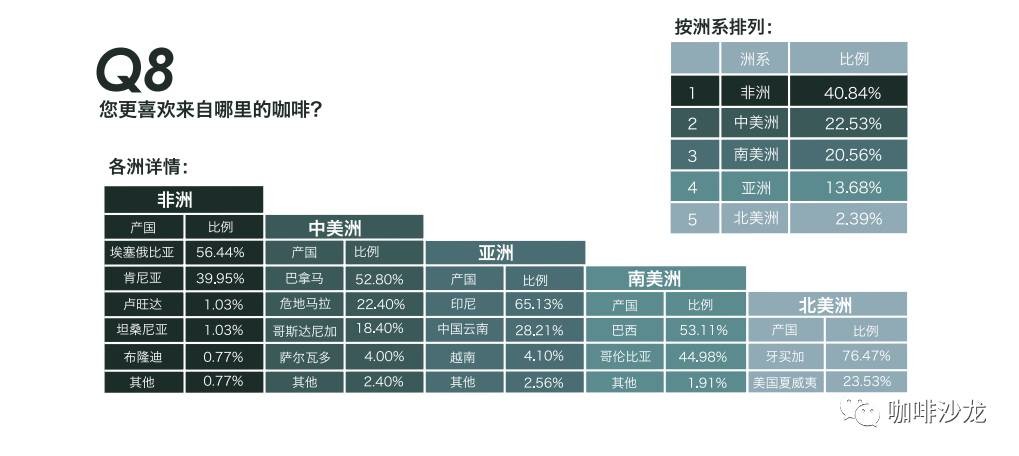
The most popular coffee producing area of baristas is Africa, accounting for 40.84%, followed by Central and South America, 22.53% and 20.56%, respectively. In Africa, the two most popular producing areas are Ethiopia and Kenya, accounting for 58.44% and 39.95% respectively. Macroscopically, African beans with outstanding fruit tone and flavor are generally more favored by baristas.
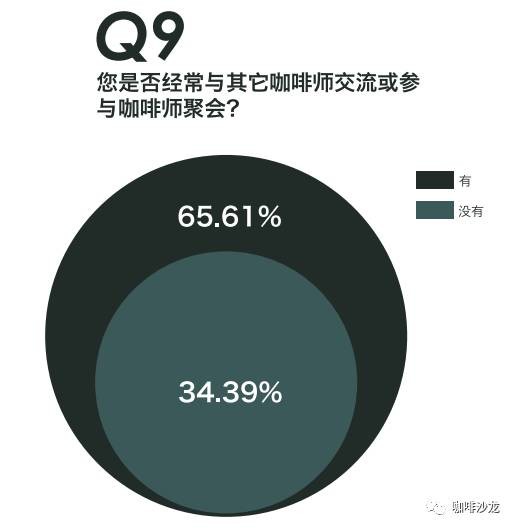
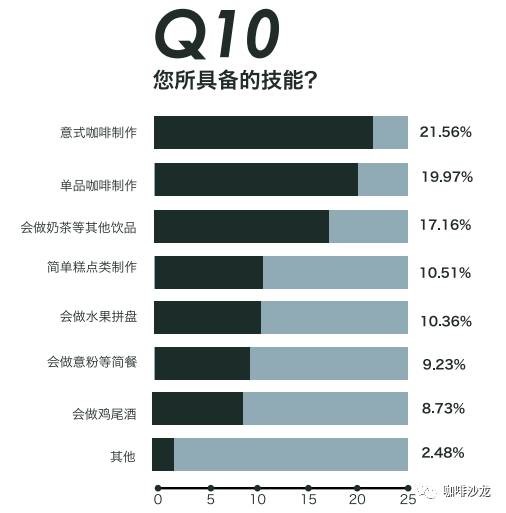
Baristas with multiple skills will be more popular in cafes. The production of coffee is only the basis of a barista. The so-called skills are not overwhelmed, and the production of other tea drinks, cakes and so on is also very important.
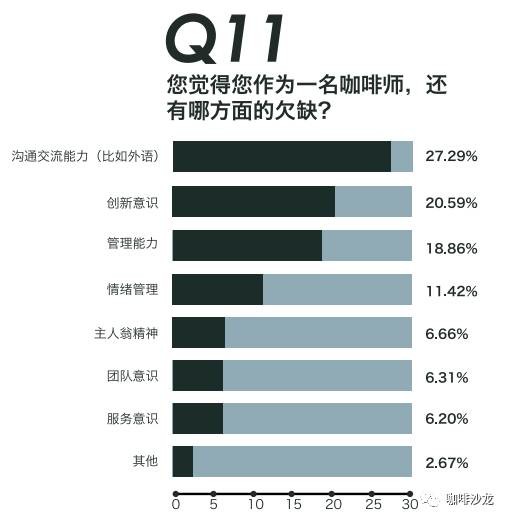
At first, many baristas specialize in techniques, but later they find that a good barista should have both comprehensive abilities, such as communication skills, innovation and management skills. It is definitely a good thing that baristas can find their own shortcomings.
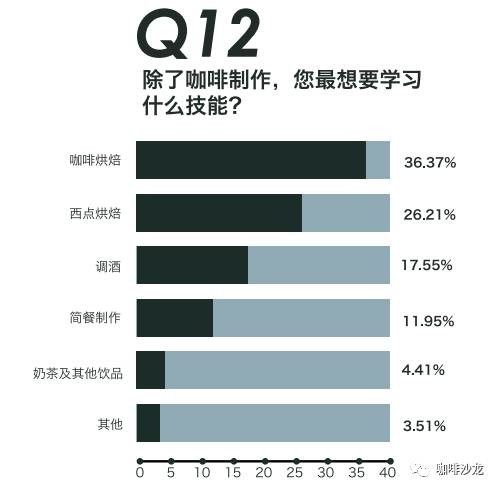
36.37% of baristas indicated that coffee roasting was the skill they most wanted to learn, followed by West Point roasting and wine blending.
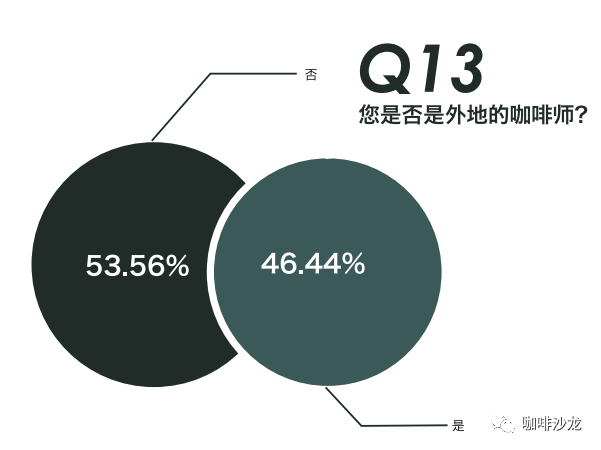
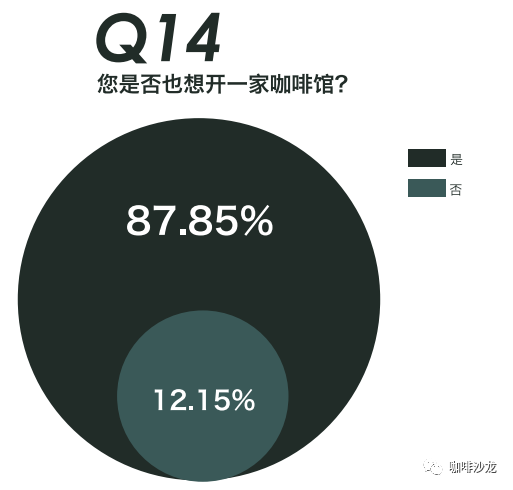
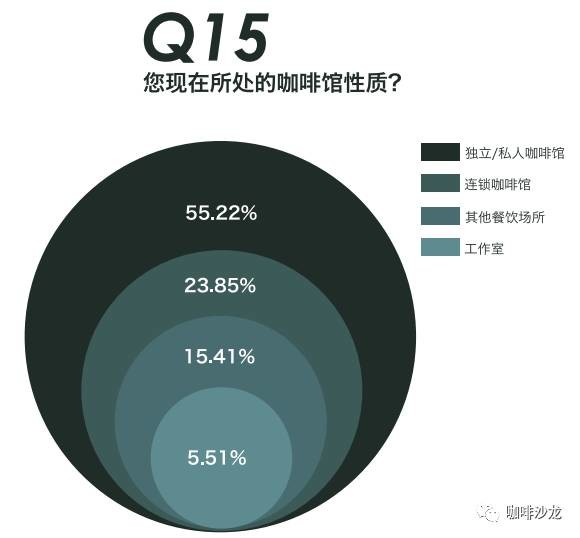
Baristas also aspire to work in cafes. 55.22% of baristas choose independent / private cafes, which have a fresh personality, while 23.85% of baristas choose chain cafes. Learning their management style in such cafes is often the reason why baristas choose chain cafes.
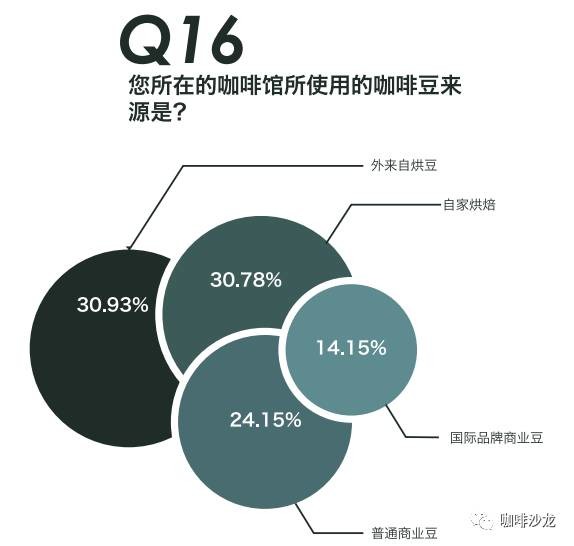
Most cafes use self-baked beans, of which the cafes that use outside baked beans account for 30.93%, while self-baking accounts for 30.78%, accounting for a similar proportion. Most cafes pursue the quality of coffee to ensure freshness.
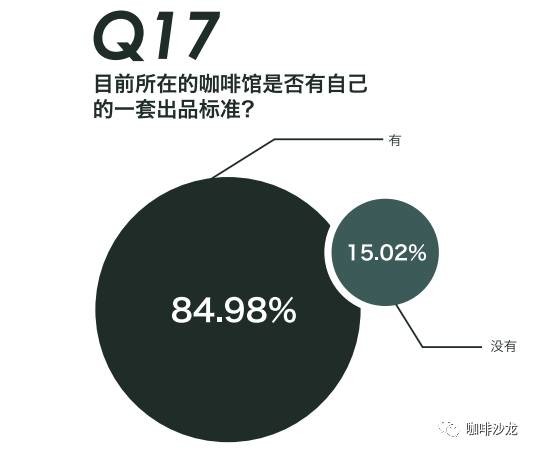
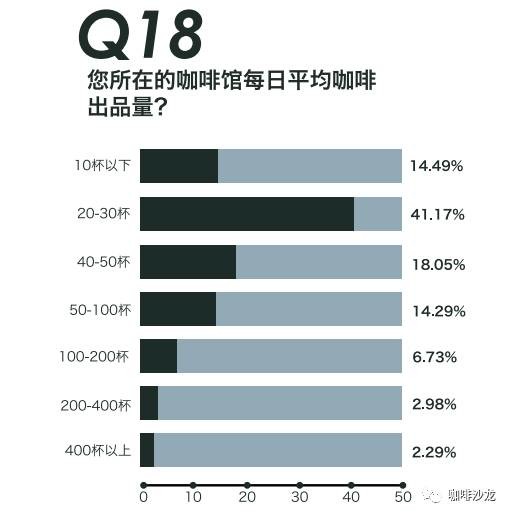
The average daily output of coffee in most cafes is 20-30 cups, accounting for 41.17%, which is lower than that of cafes in other countries. However, it is worth noting that coffee shops with an average daily output of more than 100 cups account for 12.00%, which shows that the coffee market actually has a certain consumption potential, but we need to further tap.
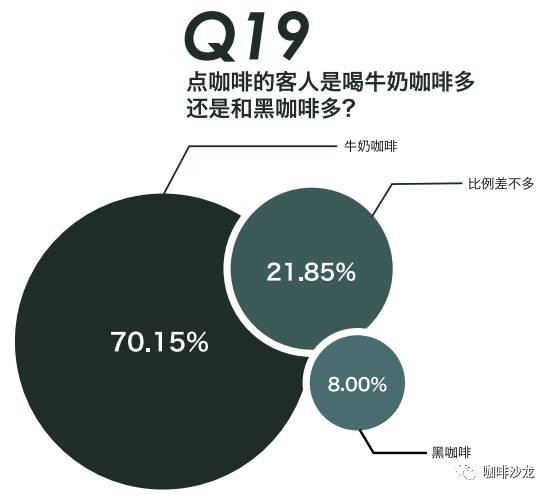
70.15% of consumers will choose milk coffee when they go to coffee shops, indicating that in most coffee consumers, milk coffee is more acceptable, black coffee accounts for only 8.00%, or a considerable number of consumers will not choose black coffee. At this point, the barista and the owner of the cafe can have a proper choice.
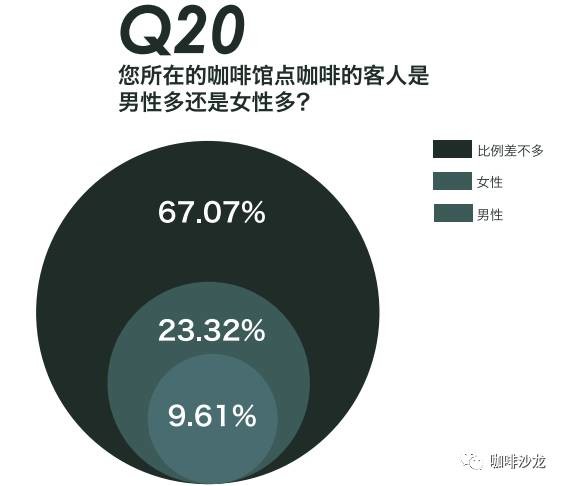
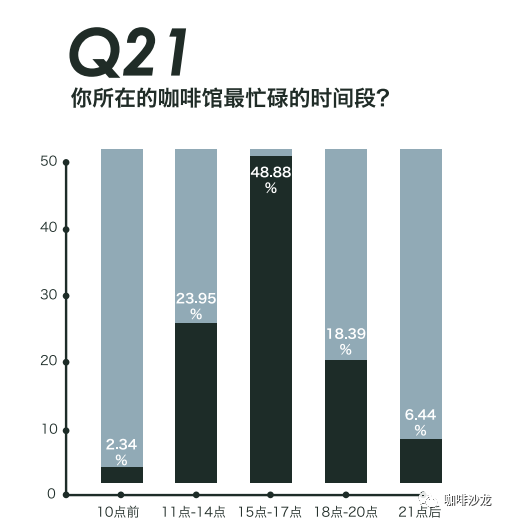
15:00-17:00 is the busy time in most cafes, with 48.88% of baristas saying this is the busiest time. 11:00-14:00 ranked second, accounting for 23.95%. 18: 00-20:00 ranked third, accounting for 18.39%.
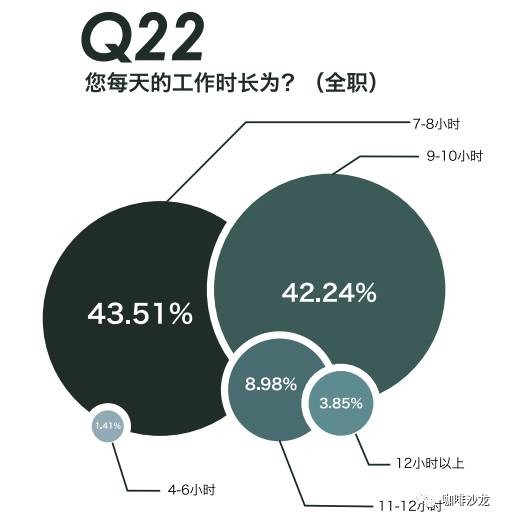
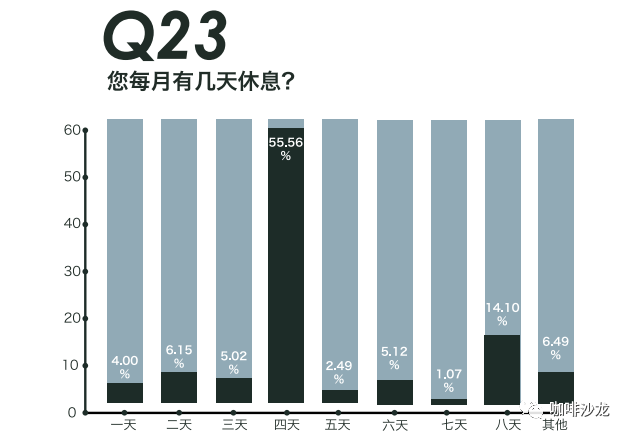
Most baristas have four days off per month, accounting for more than half, as high as 55.56%.
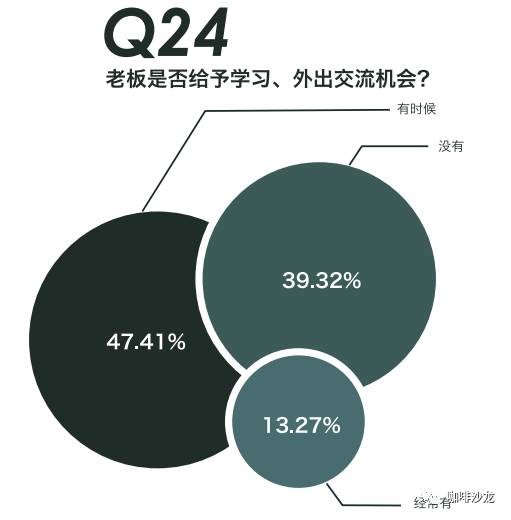
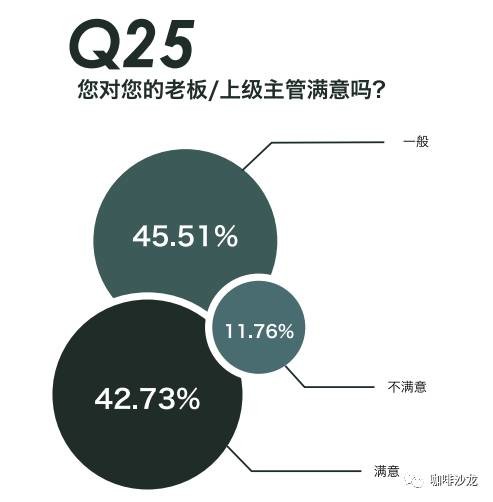
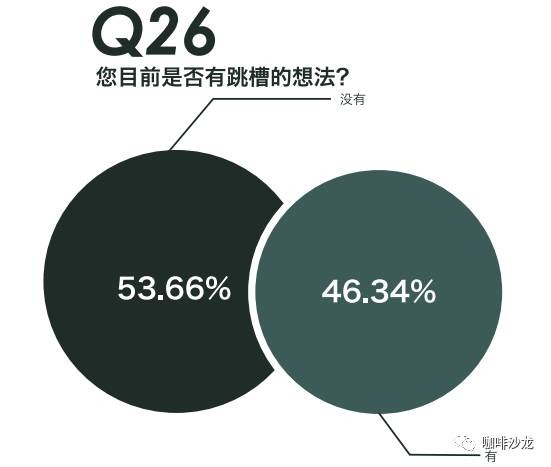
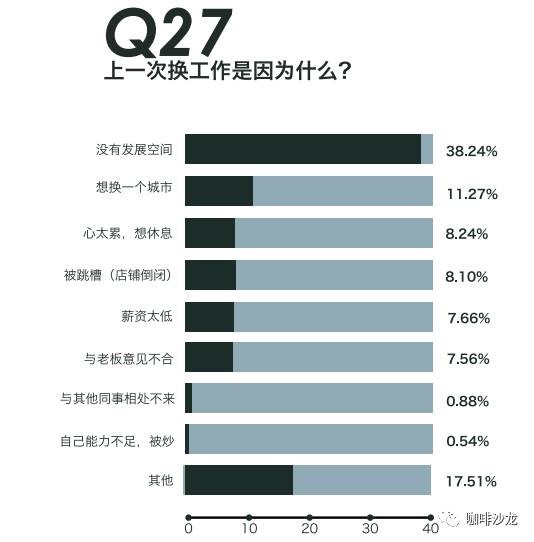
Data show that baristas prefer to come to a platform with room for development. 38.24% of baristas change jobs because there is "no room for development", accounting for more than 1/3. In addition, there are some baristas who are adventurous and want to have a different urban experience and choose to change jobs.
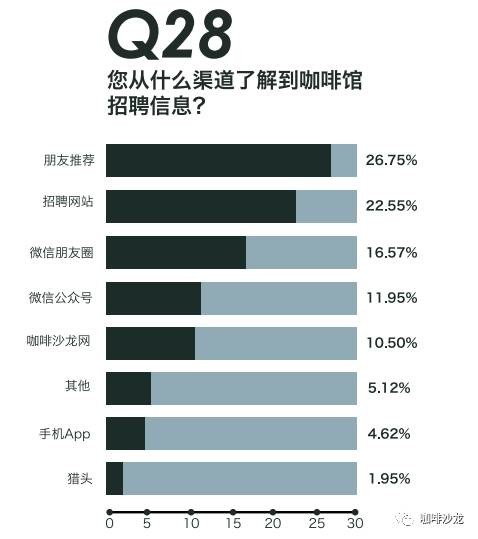
Baristas learn about recruitment information mostly through friend referrals or recruitment websites, accounting for 26.75% and 22.55%, respectively, while Wechat moments also account for 16.57%. It is worth mentioning that the coffee salon network also accounts for 10.5%, coffee salon "recruitment" Mini Program online is to help a large number of baristas to find their favorite job, coffee shop recruitment information is updated every day.
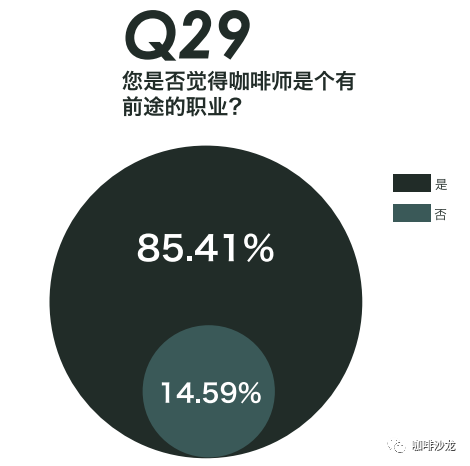
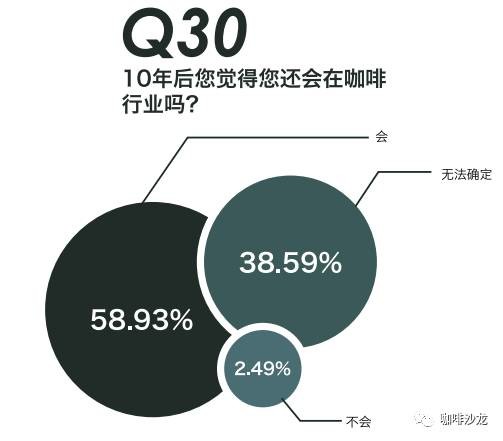
58.93% of baristas will resolutely choose to stay in the coffee industry ten years later, and 38.59% of baristas have not made their own decision, but we believe that no matter whether we are still on the road to coffee or not, those of us who have worked in the coffee industry will have an unforgettable memory.
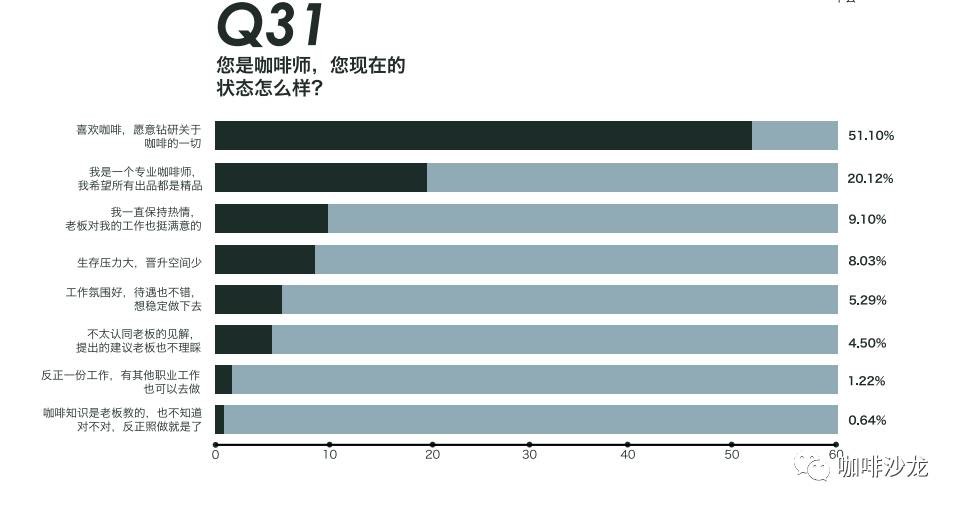
The survey shows that 85.61% of baristas are in a positive working state, and 51.1% of them say they "like coffee and are willing to focus on everything about coffee."
The position of coffee in China is changing day by day. In this three surveys, we see different identities but this love for coffee. I believe that in the future, more and more people will like coffee as a drink. Now we should also make an effort to promote coffee culture and make more people contact and like it. Looking forward to the future, coffee will bring us more wonderful stories.
Important Notice :
前街咖啡 FrontStreet Coffee has moved to new addredd:
FrontStreet Coffee Address: 315,Donghua East Road,GuangZhou
Tel:020 38364473
- Prev

The shelf life is only 25 seconds! Italians don't take out coffee. Drink before you go.
Schematic diagram of ▲ Cafe. (photo / taken from Pixabay) I can't imagine living without coffee. The Times publishes that as the most frequent coffee drinker in the world, Italians drink at a different pace than others. Italian cafes are always open from morning till night, and there is no time to be deserted all day. People like to drink espresso in cafes, while espresso
- Next

Chen Lu: just want to have a cafe
Xu Conglin Feng Tang, a record of Chen Lu, said: it seems that every woman has thought about opening a cafe at some stage in her life, if not most of them. Chen Lu, a post-90s Quzhou girl, realized this idea and opened her own coffee shop. In the inconspicuous small storefront, there is the aroma of coffee and cake, soft music and quiet small book bar. Chen Luwei came
Related
- What grade does Jamaica Blue Mountain No. 1 coffee belong to and how to drink it better? What is the highest grade of Blue Mountain coffee for coffee aristocrats?
- What are the flavor characteristics of the world-famous coffee Blue Mountain No. 1 Golden Mantelin? What are the characteristics of deep-roasted bitter coffee?
- Can I make coffee a second time in an Italian hand-brewed mocha pot? Why can't coffee be brewed several times like tea leaves?
- Hand-brewed coffee flows with a knife and a tornado. How to brew it? What is the proportion of grinding water and water temperature divided into?
- What is the difference between Indonesian Sumatra Mantinin coffee and gold Mantinin? How to distinguish between real and fake golden Mantelin coffee?
- What does bypass mean in coffee? Why can hand-brewed coffee and water make it better?
- Unexpected! Ruixing Telunsu lattes use a smoothie machine to foam milk?!
- % Arabia's first store in Henan opens into the village?! Netizen: Thought it was P's
- Does an authentic standard mocha coffee recipe use chocolate sauce or powder? Mocha Latte/Dirty Coffee/Salty Mocha Coffee Recipe Share!
- What is the difference between Vietnam egg coffee and Norway egg coffee? Hand-brewed single product coffee filter paper filter cloth filter flat solution!

